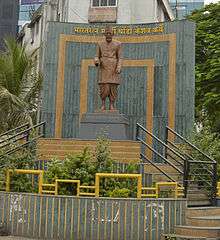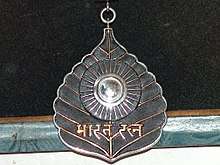Dhondo Keshav Karve
| Maharshi Dhondo Keshav Karve | |
|---|---|
 | |
| Native name | धोंडो केशव कर्वे |
| Born |
18 April 1858 Sheravali Murud, Dapoli, Dapoli, Ratnagiri, Maharashtra |
| Died |
9 November 1962 (aged 104) Pune, India |
| Occupation |
|
| Spouse(s) | Radhabai and Godubai |
| Children | Raghunath Karve, Shankar Karve, Dinkar Karve, Bhaskar Karve |
Dhondo Keshav Karve was born at Sheravali; his ancestral home. But he spent most of his childhood at place called Murud, in the district of Dapoli. He completed his primary education at a government school in Murud. Since childhood, Anna was very brilliant, intelligent and obedient. Apart from good upbringing, daily recitations of religious texts like Ramavijay, Harivijay & Shivalilamrut, made his pronunciations clear and his language pure. It was on his guru’s advice that Karve used to read newspapers in Durga temple near the school, from 5 pm till sunset because it was during this time that the devotees flooded the temple, which served the intention of making maximum people aware of public issues. When he started earning, Anna took the lead and repaired the decaying baton of the same temple. His inspiring life as a responsible citizen truly started from this place. He loved Murud with all his heart and hence he did a lot of work for this place through ‘Murud development fund’.[1] Maharshi Karve, was a social reformer in India in the field of women's welfare.He established first women's university in Mumbai(Bombay). In honour of Karve, Queen's Road in Mumbai (Bombay) was renamed to Maharshi Karve Road.
Karve continued the pioneering work in promoting widows' education. The Government of India awarded him with the highest civilian award, the Bharat Ratna, in 1958, the year of his 100th birthday.[2]
The appellation Maharshi, which the Indian public often assigned to Karve, means ”a great sage”. He was also sometimes affectionately called "Annā Karve"; in the Marathi-speaking community to which Karve belonged, the appellation "Annā" is often used to address either one's father or an elder brother. He was also the first living Indian to feature on stamp postage in India.
Personal Life
It was Murud where he spent pleasant time with his first wife, Radhabai. R.D Karve[3] (Anna Karve’s elder son) too was born in Murud. After the death of Radhabai, he remarried a widow. This spread far and wide throughout Murud and Maharashtra. The then narrow minded society of Murud did not accept Anna’s decision. It was truly unfortunate. He took it as a challenge and eventually Pune became the place where he did most of his social work for woman’s education & empowerment.
Career as a college professor
During 1891–1914, Karve taught mathematics at Fergusson College in Pune, Maharashtra.[4]
In 1958, the Government of India issued a stamp commemorating the birth centenary of Dhondo Keshav Karve.[5]
Autobiographical works
Karve wrote two autobiographical works: Ātmawrutta (1928) in Marathi, and Looking Back (1936) in English.
Depictions in popular culture
The Marathi play Himalayachi Saavli (The Shadow of the Himalayas) by Vasant Kanetkar, published in 1972, is loosely based on the life of Karve. The character of Nanasaheb Bhanu is a composite character based on Karve and other Marathi social reformers of the late 19th and early 20th century. The play itself depicts the tension between Bhanu/Karve's public life as a social reformer and his family life due to the social backlash and economic hardships his children and wife had to endure.
The film DhyasParva by Amol Palekar, based on the life of Karve's son Raghunath, also depicts the Karve family, and their social reformation projects.[6]
Awards and honours
- 1942 - awarded Doctor of Letters (D. Litt.) by Banaras Hindu University
- 1951 - awarded D.Litt. by Pune University
- 1954 - awarded D.Litt. by S.N.D.T. University
- 1955 - awarded Padma Vibhushan by the Government of India[7]
- 1957 - awarded LL.D. by University of Mumbai
- 1958 - awarded Bharat Ratna, the highest civilian award of India, by the Government of India[7]
Documentary
- Taluka Dapoli, a research based initiative, made a documentary on life of Maharshi Dhondo Keshav Karve in 2017[8].
See also
References
- ↑ "Maharshi Dhondo Keshav Karve | Taluka Dapoli". www.talukadapoli.com. Retrieved 2018-07-01.
- ↑ "महर्षी कर्वे मराठी प्राथमिक शाळा – मुरुड". talukadapoli.com. Retrieved 2018-07-01.
- ↑ "Raghunath Dhondo Keshav Karve | Taluka Dapoli". www.talukadapoli.com. Retrieved 2018-07-01.
- ↑ "Fergusson College Department of Mathematics web page". Archived from the original on 19 June 2006. Retrieved 2006-08-11.
- ↑ "Archived copy". Archived from the original on 17 February 2015. Retrieved 27 January 2014.
- ↑ "Dhyasparva - A film by Amol Palekar".
- 1 2 "Padma Awards Directory (1954-2007)" (PDF). Ministry of Home Affairs. Archived from the original (PDF) on 10 April 2009. Retrieved 26 November 2010.
- ↑ "Maharshi Dhondo Keshav Karve | Taluka Dapoli". www.talukadapoli.com. Retrieved 2018-07-01.
| Wikimedia Commons has media related to Dhondo Keshav Karve. |
